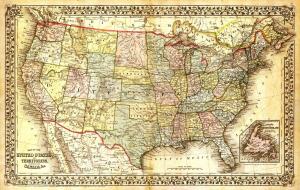What Do a National Repentance?
I’ve been giving more thought to this post. If we want to practice national repentance, then as Catholics, our model is the sacrament of penance. Seems straightforward enough, right?
However, in order to actually put that into practice, we’re going to need to muscle our way through some pretty uncomfortable stuff. That’s kind of how this works—repentance means (among other things) accepting responsibility, and that’s an uncomfortable thing to do. It’s a blow to our ego. But it also is, or ought to be, part of every Christian’s continual modus operandi. Christ did not come saying, “Relax, for the kingdom of God is at hand.”
The Theology of Repentance
The best description of penance that I’ve yet come across actually comes from a Protestant source, namely Dorothy Sayers’ introduction to the Purgatorio. Here’s a chunk of it.
Suppose that, in a fit of rage, or through carelessness, you have destroyed a valuable vase belonging to a friend. The effect of this act is to disturb the friendly relations between you, and to bring matters back to normal it is necessary that you should be (a) sorry, and (b) forgiven.
The first necessity is that you should “accept judgment”—i.e., admit that you are in the wrong. The vase did not “come to pieces in your hands,” and nobody else knocked it out of them: your own ill-temper or your own negligence are to blame. When you have frankly admitted this, first to yourself and then to your friend, you have have performed the first of the three parts of Penance, viz. Confession.
The next necessity is that you should both be sorry, and say that you are sorry, for what you did, and for the fault that caused you to do it; and that you should ask to be forgiven. This is the second part of Penance, viz. Contrition.
When this is done, your friend forgives you, and good relations are restored. You are now, without any further act, free of the guilt of your evil act: in technical language you have “purged the culpa.” [This is effected sacramentally in absolution.]
Two things, however, remain: the vase is still broken, and you yourself are still liable to attack by the rage or negligence which caused the trouble in the first place. Technically, you have still to “purge the reatus.”1 This leads you to the third part of Penance, viz. Satisfaction, and calls for two further actions: reparation to your friend and amendment in yourself.
Note that if you are really sorry, these are acts which you will wish to perform. … Even though you have been forgiven, you will want to “make it up to” your friend as best you can; and you will also be particularly anxious to rid yourself of any tendency to fall into the same fault again.
Hauntings
That first step, confession, is where we have to start. There can be no repentance if we won’t admit responsibility for a wrong. And this is where we, as in we white people, tend to start running into problems.

It is obviously true that white Americans today are not personally responsible for the trans-Atlantic slave trade; no living person is. It is also obviously true that most white Americans today have not personally uprooted First Nations from their homes in order to take away their land.2 As far as I know, nobody is disputing that. The problem is, a lot of white Americans jump from that to “It isn’t my fault, so I shouldn’t have to do anything about it.” That really isn’t how responsibility works, especially not on a national scale.
Imagine a man called A steals B’s land. A is a smart crook, and makes a huge profit off the resources from it, which he then passes on to his heirs; B’s heirs get nothing, and the struggle just to stay alive keeps them from building up any wealth. Three generations later the situation is much the same: G, A’s great-grandson, is not personally guilt of stealing from B’s great-grandson H, nor indeed of stealing from B—but he’s still profiting from a situation that was originally established by an injustice. He may not be guilty, but he is responsible, in that he is the one with the power to set things right now. Which means that, at least once he’s fully aware of the facts, G has a decision to make.
Time does not heal. Correcting injustice heals; nothing else does. The spirits in ghost stories don’t stop haunting houses just because the previous occupants moved out, still less because they’ve been haunting it for a long time.

“Our Forefathers Brought Forth on This Continent …”
Of course, some people take this further. Sometimes G tries to pretend that what A did was justified: “B wasn’t exploiting the land to its full potential”—as though that were anyone’s business but B’s, even if it were true. The ideas of “manifest destiny” or “American exceptionalism” were favorites once upon a time, and some versions of nationalism (notably Trump’s educational priorities) have tried to revive them. I have always despised this kind of thinking. It’s blatantly unbiblical to pretend that the US has some sort of hallowed status; perhaps a Mormon could argue for it, but no Catholic could. The only country the Bible concerns itself with is Israel, and that concern clearly doesn’t take the form of viewing Israel in a universally favorable light.
Or G will insist, angrily or tearfully, “My ancestors weren’t monsters!” Which really isn’t relevant. Because the question is not whether A was a monster; it’s whether A did something that was wrong. You don’t need to be a monster to be a sinner. And if the kind of wrong thing his ancestor did is the kind of thing G considers monstrous, then either G has to accept that A did something monstrous, or G has to lie—there is no third option, and the second is certainly neither right nor Christian. What’s needed here is not loyalty but honesty; a loyalty that can’t survive honesty does not deserve to survive.
The Mirror of America
So what is it we have to face? What is the “confession” part of national repentance? Two main things present themselves:
- The violent conquest of about 40% of North America, killing or displacing the original inhabitants and taking away their land.
- The kidnapping and enslavement of many millions of Africans and their descendants.

These things are how the United States as we know it came into existence. There is no getting around them. We need to be able to say, in plain English, that these things were evil and that we are still living with their consequences, because that’s the truth. Until we can do that we will not be able to move on to the next stage of national repentance.
1Culpa and reatus are Latin words which translate, more or less, as “blame, fault” and “accusation, charge.”
2I specify “most” here because, while the slave trade has been legally extinct for a century and a half, US encroachment on First Nations land is an ongoing problem. There are living people guilty of it.













